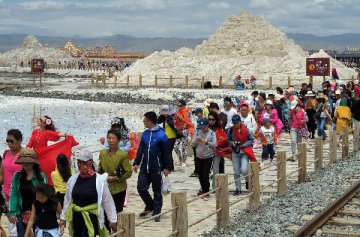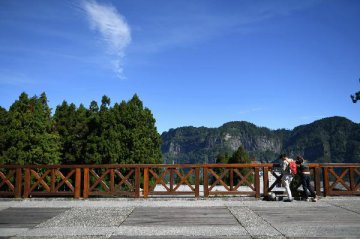
With the backdrop of the Himalayas and the Yarlung Zangbo River at its front, the Hilton Nyingchi Resort in the city of Nyingchi in Tibet has added a modern touch to the region.
The Hilton is the first international brand resort in Nyingchi and the Hilton Group's first hotel in Tibet.
The hotel opened in late March this year, taking about three months to prepare for the opening, a record short time for the Hilton Group, according to Larry Gao, general manager of the Hilton Nyingchi Resort.
"We wanted to open it ahead of the annual peach blossom season, which attracts about 600,000 tourists this year," Gao said.
More and more visitors come to the hotel as Chinese travelers are increasingly affluent, and over 14,000 people have stayed in the hotel since it opened, an impressive performance for a new hotel, Gao said.
In addition to high-end hotels, local people are also benefiting from Tibet's tourism boom.
Sangshi has earned about 120,000 yuan each year since she opened a guesthouse near Basum Lake in 2013. She used to make just 30,000 yuan a year through her tea shop.
Her village is currently home to 31 guesthouses, raking in a total of over 3 million yuan in accommodation last year.
Basum Lake will soon be rated as a five-A tourist spot, the highest official rating for tourism, becoming the first ecological spot in Tibet to earn the qualification.
Tibet is promoting tourism, which has become a major driver of the region's growth. It currently contributes to over 30 percent to the region's total GDP.
"Tourism produces pollution-free GDP and is a pillar sector in line with our green development path," said Zhang Gengyun, vice mayor of Nyingchi.
Visitors to Tibet grew from 10 million people in 2012 to over 23 million in 2016, growing 21.6 percent year on year. Tourism revenues grew by 27.2 percent each year, exceeding 33 billion yuan in 2016.
"Transport is the major factor checking tourism growth in Tibet. The Nyingchi Mainling Airport is one of the busiest airports in China and it's not easy to book tickets," Zhang said.
The rapid growth of travelers to Tibet is bolstered by convenient transport conditions. The total length of highways in Tibet grew from 65,198 kilometers in 2012 to over 82,000 kilometers today. High-grade highways saw their mileage increase six-fold from 2012 to 2016.
Tourism in Tibet is expected to see surging growth once the railway opens linking Sichuan Province's capital city Chengdu with Lhasa around 2025, Zhang said.
The Hilton Group is considering setting up hotels in two other Tibetan cities, Lhasa and Xigaze, according to Gao.
"We are very confident that Tibet's tourism industry will continue to grow as transport and other infrastructure improves," Gao said.






















Latest comments